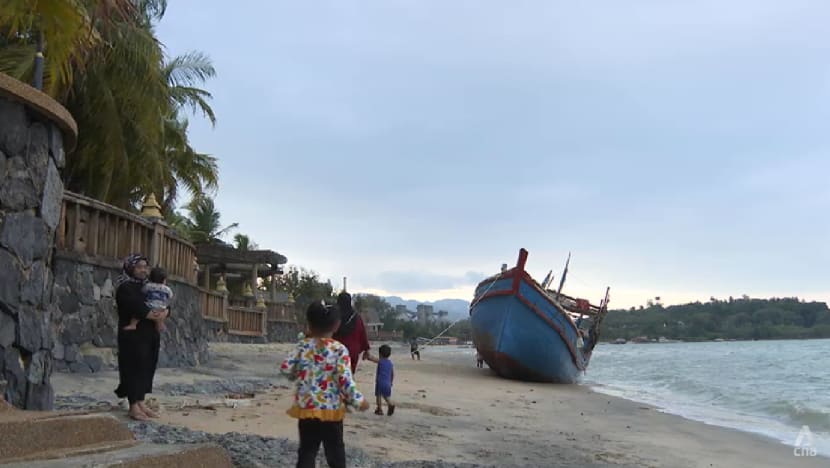Malaysia turns away hundreds of Rohingya refugees amid local concerns
With much of the world focusing on other geopolitical issues, the Rohingyas hope that their plight will not be forgotten.

Malaysian authorities have turned away several boats ferrying Rohingya asylum seekers this year amid concerns from the local community. This included a wooden boat loaded with nearly 200 ethnic Rohingyas escaping persecution in Myanmar who landed on the shores of Teluk Yu, a tourist attraction in popular holiday island Langkawi, in the wee hours of Jan 3.

This audio is generated by an AI tool.
LANGKAWI: Malaysian authorities have turned away several boats ferrying Rohingya asylum seekers this year amid concerns from the local community.
According to the Malaysian Maritime Enforcement Agency, two boats with about 300 asylum seekers were turned away recently after they were given food and water.
They were later reported to have landed near Aceh, Indonesia.
“TAKING OUR RIGHTS AS MALAYSIANS”
“Our enforcement team detects their boats almost every day, floating in international waters,” said Malaysia's Home Affairs Minister Saifuddin Nasution Ismail.
“Recently, a boat landed in Langkawi. We have put those detained in the immigration depot. We are profiling them on humanitarian grounds.”
In the wee hours of Jan 3, a wooden boat loaded with nearly 200 ethnic Rohingyas escaping persecution in Myanmar landed on the shores of Teluk Yu, a tourist attraction in popular holiday island Langkawi.
Many of them were women and children seeking asylum in Malaysia.
They hid on the lower deck of the boat which was camouflaged as a fishing vessel. Clothes and leftover food were strewn all over the front deck.
They were arrested by the island police and later handed over to the immigration department.
Many among the local community feel uneasy about the presence of such foreign vessels. There have not been any boat landings in the last four years, they said.
“I don’t like it. They’re taking our rights,” said one local. “They’re taking our rights as Malaysians, like using our hospitals (and) they can go to school. This isn’t right, it’s not fair.”
As of the end of last year, the United Nations High Commissioner for Refugees (UNHCR) recorded almost 200,000 refugees and asylum seekers in Malaysia.
About 170,000 registered are from Myanmar, and the majority are Rohingyas.
For decades, the ethnic Rohingyas have faced persecution in Myanmar.
Ten of thousands have fled Rakhine state on rickety boats across the choppy seas from the Bay of Bengal to reach Malaysia in a journey that could take up to two weeks.
“CRISIS WITHIN A CRISIS”
Rohingya refugee Arfaat Mohammed Emran fled Maungdaw, a town in Rakhine State, and arrived in Malaysia almost a decade ago.
He now teaches at a community school funded by UNHCR in Langkawi.
The father of two is grateful to Malaysia for giving him and his family temporary refuge, despite not being a signatory to the UN convention on refugees.
“We feel safe, but not for a long time,” he added. “We have been waiting for UN consideration for any resettlement, or if our country is at peace, we need to return to our country, like voluntary return.”
But the situation back home appears to be worsening with the army cutting off communication, he said.
Arfaat hopes that Malaysia's role as the chair of the Association of Southeast Asian Nations (ASEAN) this year will put a spotlight on the plight of Rohingyas and stop the persecution.
At least 30 ASEAN meetings will be held in Langkawi this year.
“It's a crisis within a crisis,” said Thitinan Pongsudhirak, director of the Institute of Security and International Studies at Chulalongkorn University’s Faculty of Political Science.
“On one hand, there's a crisis of the coup and civil war that has to be resolved somehow, and ASEAN has a big, leading role in that,” he added.
“But within that crisis, ASEAN also has to bear in mind the Rohingya crisis within Rakhine State, and to somehow deal with the Arakan army so that they tone down, they cease their persecution of the Rohingya Muslims.”

















